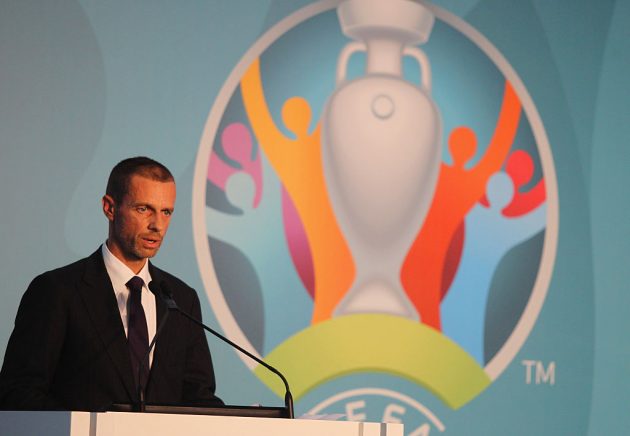It feels symbolic that two of the biggest football transfers of the summer should precede the death knell for Financial Fair Play, the rules designed to rein in spending that now look set to be replaced with a salary cap and luxury tax.
Paris Saint-Germain’s signing of Lionel Messi and Manchester City’s Premier League record £100m purchase of Jack Grealish may not have delivered the knockout blows to Financial Fair Play (FFP), and neither did they appear to infringe any rules.
Then again they didn’t need to: through legal challenges and political manoeuvring, Europe’s richest clubs have fatally weakened FFP to the point where they can do much as they please.
Barcelona’s financial distress, meanwhile, shows that the rules introduced a decade ago are not even fit for protecting clubs, never mind improving competitive balance.
“Clubs and fans have lost confidence in the old system,” says Simon Leaf, head of sport at Mishcon de Reya. “This is a chance for Uefa to reset and rethink how it goes about regulating these things.”
European governing body Uefa is understood to have settled on a new, two-pronged system of regulation to replace FFP. It comprises a salary cap in tandem with a luxury tax and is expected to be formally proposed it next month.
The salary cap could be a hard cap – in other words, set at a fixed sum – or a soft cap, based on a percentage of a club’s revenue; a figure of 70 per cent has been mooted.
A club that exceeded its salary cap would have to pay a “tax” equivalent to 100-200 per cent of the overspend into a pot that is then redistributed to other teams.
Neither a salary cap or luxury tax are new concepts; both are prevalent in US sports, notably basketball and baseball, while the former exists in English rugby union.
But industry insiders, economists and lawyers have raised serious questions about whether Uefa’s proposed new system is suitable for European club football and can succeed where FFP has failed.
Why a salary cap is simpler than FFP – but still limited
Perhaps the main advantage of replacing FFP with a salary cap is that it ought to be simpler to establish how much each club is permitted to spend.
Where FFP was about profit and loss, and that calculation muddied by clubs being allowed to deduct spending on certain items including youth development and stadium infrastructure, a salary cap is just about revenue.
So if Manchester City earn £400m and Uefa’s salary cap is set at 70 per cent, the Premier League champions will know they are able to spend £280m a year on their wage bill.
It is also clear that, perhaps contrary to popular belief, a majority of clubs do want some kind of spending rules in place; even the “dirty dozen” European Super League rebels intended to cap salary spend at 55 per cent of revenue.
A salary cap may be a preferred method of cost control for clubs because it would allow them to cite it in negotiations with players as they seek to limit wage inflation.
But that is also just one example of why the proposals are fraught with legal issues.
Uefa is fundamentally limited in how strictly it can regulate clubs by uncertainty over the extent to which European courts will back the governing body, says sports law expert Darren Bailey.
The failed European Super League breakaway spawned an ongoing legal challenge by Juventus, Barcelona and Real Madrid to Uefa’s dual role as promoter and regulator.
Until it is resolved, the most Uefa can offer is “one-arm-behind-the-back regulating”, says Bailey, who has shaped the legal frameworks of the Football Association and World Rugby and is now a consultant at Charles Russell Speechlys.
“The lighter touch you go, the less you interfere with the operations of the market and these big clubs, the less vulnerable you are to legal challenge,” he adds.
Old legal disputes that dogged FFP likely to dog new rules
Then there are the interests of players and agents, which the English Football League (EFL) chiefs found out the hard way last season cannot simply be ignored.
At the height of the pandemic the EFL secured agreement from League One and Two clubs to adopt a salary cap of £2.5m. After half a season, players’ union the PFA had seen it off.
Salary caps have worked in the US, but the landscape is very different there, with closed leagues, collective bargaining, more equitable revenue distribution and a completely different transfer system.
Buy-in from players’ unions has been key. Ominously for Uefa, the general secretary of international union of footballers Fifpro, Jonas Baer-Hoffmann, has called salary caps “philosophically and economically incompatible with a transfer fee system”.
 Manchester City, who have battled Uefa over Financial Fair Play, signed Jack Grealish for £100m this summer (Getty Images)
Manchester City, who have battled Uefa over Financial Fair Play, signed Jack Grealish for £100m this summer (Getty Images)
The legal consensus is that Uefa will be able to implement a soft cap and luxury tax in place of FFP without waiting for any European court judgements relating to the European Super League.
But old arguments that dogged FFP, such as over how much a club had legitimately generated – a feature of disputes involving Qatar-sponsored PSG and Abu Dhabi-funded City – are unlikely to disappear without very strict guidelines.
“The details matter,” says Bailey. “The narrower the definition of revenue (applied by Uefa) the more effect it is likely to have.”
US sports, meanwhile, have shown that caps “may lead to under-reporting of salaries/over-reporting of revenues”, says economist Professor Thomas Hoehn of Imperial College. “Significant monitoring would be required.”
Why salary cap could be even worse for competitive balance
Even in the scenario that Uefa is able to apply a salary cap and luxury tax effectively, there is little evidence to suggest that it will achieve one of its key objectives: stimulating competition.
“The benefit of a salary cap rests on competitive balance,” adds Hoehn, who co-authored influential research paper The Americanization of European Football. “This depends on details but there is no guarantee and it may even make it harder for smaller teams.”
Using a percentage of revenue as a salary cap, for example, affords an obvious advantage to bigger clubs and “bakes in a competitive imbalance”, says Bailey.
Unless Uefa includes the threat of a ban for repeat offenders – one measure believed to have been discussed – a luxury tax alone may not prove a sufficient deterrent for the richest clubs.
“The problem is that financial regulation doesn’t create a level playing field. I don’t think that will change,” says Leaf. “If anything it will probably get worse. It’s potentially giving clubs a way to spend their way out of an issue.”
So, what is the answer? Some form of regulation is required; as established, most clubs want it and Uefa can argue with some justification that FFP has been broadly beneficial.
It has made European football more financially sustainable; Uefa reported in 2018 that clubs had swung from losses of €1.7bn in 2011 to profits of €600m. But for FFP, far more clubs may have been vulnerable to going bust in the pandemic.
And while it may not appear as urgent an issue in the Premier League, competitive imbalance is a concern across the continent, including in the other Big Five European leagues where Bayern Munich, Juventus, PSG and Spain’s big two have enjoyed sustained dominance.
 Uefa (president Aleksander Ceferin pictured above) is expected to lay out proposals to replace FFP with a salary cap and luxury tax in September (Getty Images)
Uefa (president Aleksander Ceferin pictured above) is expected to lay out proposals to replace FFP with a salary cap and luxury tax in September (Getty Images)
One solution would be to have stricter limits on squad sizes, argues Bailey. A hard cap on the number of players a team could register would lead to a “more effective talent redistribution process” as clubs would not be able to stockpile talent.
Another way of tackling the problem would be to tighten loopholes around revenue and related-party transactions, says Leaf, such as state-owned companies investing in clubs effectively owned by the same state. City’s sponsorship deals with airline Etihad and PSG’s contracts with the Qatar Tourism Agency have both been the subject of intense scrutiny on this basis.
In the event that domestic leagues followed Uefa in adopting a salary cap and luxury tax system, Hoehn believes promoted teams should have “greater freedom to invest over the medium term”.
It seems inevitable, though, that no matter how it is applied, Uefa’s next system of regulation will not banish the problems of FFP, merely reframe them.
The solution to football’s problems may require more fundamental change, says Bailey: the creation of the “cohesive overall financial regulatory structure” that the game lacks.
“The concept of Americanisation – or privatisation – of sport is really on a knife-edge,” he adds.
“Picking off small elements of the American model to plant into a very different multi-jurisdiction European model has real potential unintended consequences.
“This feels like a really important moment: where we are with the European legal cases drifting through courts, the post-pandemic situation and the crisis of major clubs.
“Is this the perfect time to come up with a solution that deals with all these issues in one go?”